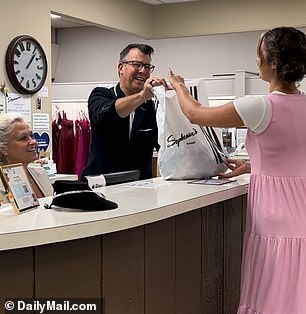America’s $93 BILLION ‘swipe fee’ rip-off: Small business owners call for clampdown on credit card charges which are pushing up the cost of YOUR groceries
Small business owner Danny Reynolds pays so much in credit card fees that it’s equivalent to the salary of a starting employee.
Reynolds, who has run Stephenson’s of Elkhart, a clothing store in Elkhart, Indiana, for 28 years, would like to hire more employees, but skyrocketing credit card fees make that impossible.
Retailers have long complained that the so-called “swipe fees” they have to pay to process credit card transactions in the US are much higher than anywhere else in the world.
The fee averages 2.24 percent of the total transaction in the US, but can be as high as 4 percent for premium travel and rewards cards. In the EU, fees were limited to 0.3 percent in 2015.
Merchants paid an estimated $93 billion in Visa and Mastercard fees last year, according to an industry publication The Nilson Report – compared to about $33 billion in 2012.
According to industry publication The Nilson Report, merchants paid an estimated $93 billion in Visa and Mastercard fees last year – up from about $33 billion in 2012
Visa and Mastercard control 83 percent of the U.S. credit card market, meaning they have the ability to solve the swipe fees paid by retailers.
Network fees are paid by Visa and Mastercard, while interchange fees go to the bank that issued the card.
The networks are also reportedly planning to increase these fees even further next month.
“These reimbursements can make a difference if we can hire someone from our community,” Reynolds told DailyMail.com.
“I remember about thirty years ago, when I was just starting out, looking at our financial statements and realizing that credit card purchases made up 50 percent of our transactions. Fast forward to 2023, and that’s over 90 percent.
‘These costs have increased over the years, but they really increased during the Covid-19 shutdown when virtually all transactions were online.
‘Then I realized that Visa and Mastercard were really taking advantage of this situation. It feels like they know they have us captured and they know the market is monopolized – or duopolized. It just doesn’t seem right to me,” he said.

Danny Reynolds has run Stephenson’s of Elkhart, a clothing store in Elkhart, Indiana, for almost 30 years
As retailers suffer, so do consumers. Swipe fees have become too high for many merchants to absorb, forcing shoppers to foot the bill.
According to the National Retail Federationthese costs cost the average American household $1,000 per year in higher prices.
“The fees are a percentage of a transaction amount, so they automatically increase if there is inflation,” says Doug Kantor of the Merchants Payments Coalition.
‘The fees go up and that acts as a multiplier on that inflation effect because traders then have to increase their prices. They have to chase their tails to keep up with the increases.”
While many retailers have been forced to raise prices, Victor Garcia, owner of two ice cream shops near Fort Worth, Texas, has even put up signs in stores urging customers to think twice before paying with plastic.
He told NPR: ‘Most are shocked. Half of them say, “Gosh, I don’t have any cash. I wish I did.” People don’t know. They just say, ‘Hey, I’m getting points, so I’m going to use my card.’
Credit card charges cost Garcia more than $25,000 last year.
“On average, fees are the second highest operating costs that regular sellers have, after labor costs,” Kantor told DailyMail.com. “Every time we make a purchase, we all pay the cost of these fees.”


The amount business owner Danny Reynolds pays in credit card fees each year is the equivalent of an entry-level employee’s salary
And if a customer pays with a rewards card, the swipe fee is even higher, he explained.
This means that lower-income cash customers are effectively subsidizing the deals and rewards that go to better-off card users.
“Low-income consumers with low credit scores regularly send money to people with higher incomes through this system,” Kantor says.
This is reported by a Federal Reserve report from December 2022, this system will transfer $15 billion each year “from lower to higher educated, poorer to richer, and high to low minority areas, widening existing disparities.”
Reynolds said he has a friend who owns a grocery store and who says she’s better off giving away a coffee for free than having a customer use a rewards card to buy it.
Lawmakers are pushing for one account that would require major credit card issuers to allow a network other than Visa and Mastercard to process transactions – which they hope would result in market competition and lower costs.
Earlier this month, a group of senators, along with the Merchants Payments Coalition and small business owners from across the country, held a press conference to call on Congress to pass their Credit Card Competition Act.
“Our bipartisan legislation, which has the support of a wide range of small business owners, would create real competition in the credit card market,” said Democratic Sen. Dick Durbin.
“It is long past time for Congress to break the sweetheart deal that Visa, Mastercard and the big banks enjoy.”
The credit card networks have pulled out, arguing that it would jeopardize their ability to offer rewards to customers.
But for Reynolds, who spoke at the conference, it’s simple.
“All we’re asking for is an open market and a competitive playing field,” he said.
